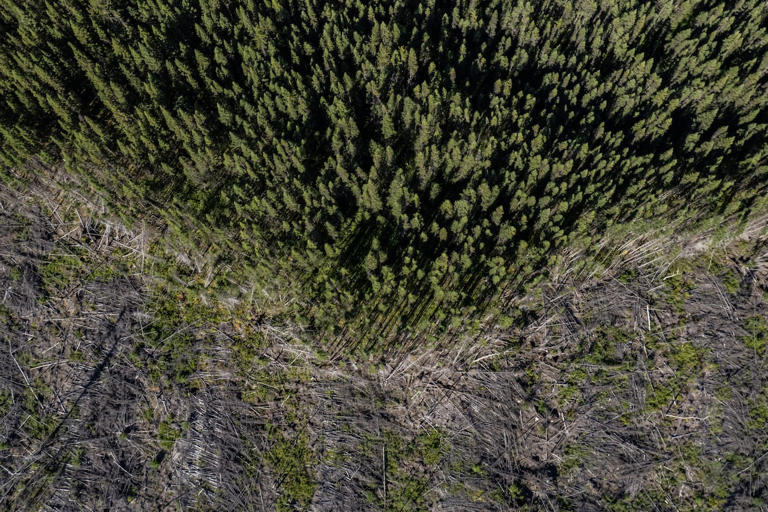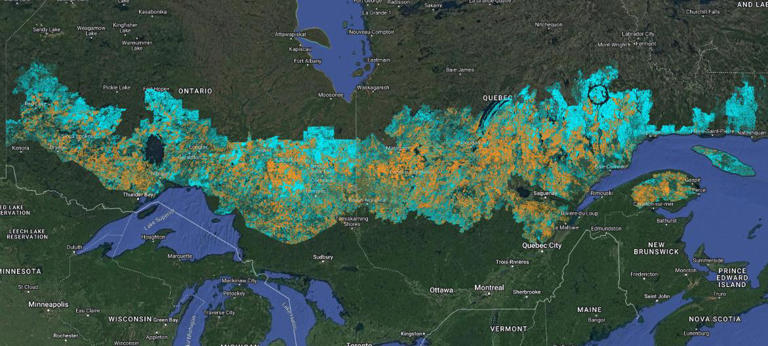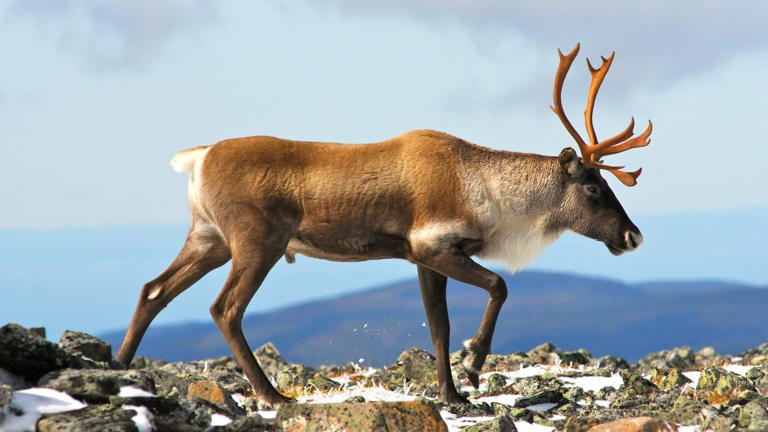
Story by Benjamin Shingler • CBC
Canada is home to the largest boreal forest in the world, a vast expanse of wilderness rich in biodiversity that stretches from coast to coast.
But a major new study examining nearly a half century of logging in Ontario and Quebec warns that clear-cutting has left forests in the provinces severely depleted — and puts woodland caribou at risk.
The peer-reviewed research, published in the academic journal Land, found that logging practices between 1976 and 2020 have resulted in the loss of more than 14 million hectares of forest, an area roughly twice the size of New Brunswick.
There are only 21 million hectares of older forest (defined as forests 100 years or older) remaining in the region.
"We have been cutting the heck out of the boreal forest," said Jay Malcolm, a professor emeritus of forestry at the University of Toronto, and one of the authors of the study, conducted by researchers in Canada and Australia.
The researchers calculated that older forests make up only 42 per cent of the forest area, and most of the remaining older forest is in the remote north.
"It's very frightening. It was startling to see how little is left and how badly fragmented it is," said Malcolm.
Canada is home to the largest boreal forest in the world, a vast expanse of wilderness rich in biodiversity that stretches from coast to coast.
But a major new study examining nearly a half century of logging in Ontario and Quebec warns that clear-cutting has left forests in the provinces severely depleted — and puts woodland caribou at risk.
The peer-reviewed research, published in the academic journal Land, found that logging practices between 1976 and 2020 have resulted in the loss of more than 14 million hectares of forest, an area roughly twice the size of New Brunswick.
There are only 21 million hectares of older forest (defined as forests 100 years or older) remaining in the region.
"We have been cutting the heck out of the boreal forest," said Jay Malcolm, a professor emeritus of forestry at the University of Toronto, and one of the authors of the study, conducted by researchers in Canada and Australia.
The researchers calculated that older forests make up only 42 per cent of the forest area, and most of the remaining older forest is in the remote north.
"It's very frightening. It was startling to see how little is left and how badly fragmented it is," said Malcolm.
Caribou herds under threat
Using satellite imagery and government data, the study found that only eight patches of older forest greater than 500 square kilometres are still intact in Ontario and Quebec.
The patchwork of remaining older forests threatens the survival of woodland caribou, which require large areas of undisturbed habitat for their survival.
Nearly all remaining caribou herds in Ontario and Quebec — 19 of 21 — are considered at "high risk" or "very high risk" because of disturbances to their habitat.
Environmental groups have been calling for more stringent measures to protect the dwindling caribou population.
"This paper shows that our logging practices are not, in fact, sustainable," said Rachel Plotkin, boreal project manager with the David Suzuki Foundation.
"What caribou need is to have the habitat that they depend upon protected and where it's already been degraded, to have it restored."

An aerial view shows an area of the boreal forest in Quebec where trees were felled during salvage logging efforts following an insect outbreak near Baie-Comeau, Que., in August 2022. A recent study, published in the academic journal Land, found that logging practices since 1976 have resulted in the loss of more than 14 million hectares of boreal forest, an area roughly twice the size of New Brunswick.
(Ed Jones/AFP/Getty Images)© Provided by cbc.ca
Caribou feed on lichen, which grow on the floor of older forests. Plotkin said the disappearance of those feeding grounds and an expanding network of logging roads that make it easier for predators like wolves to track caribou have contributed to their decline.
According to Plotkin, the federal government hasn't done enough to manage the problem.
"Even if only one per cent of a forest is cut annually, Canada will say, 'Don't worry, we're unlocking one per cent of our forest every year.' But in 100 years the entire forest is going to be logged," she said.
Forests planted after logging are more limited in the variety of species they contain and don't have the attributes that favour caribou, like a floor rich in lichen, she said.
"We're not managing our forests so that they have old growth, and the roads that are used by forestry operations will be the lasting legacy that impact wildlife species like caribou."
In a statement, Natural Resources Canada said it is "committed to the protection" of at-risk species, including caribou.
"The government continues to work with provinces, territories, Indigenous peoples and stakeholders," the statement said.

A map prepared for the study features orange areas to indicates places that have been logged in Ontario and Quebec since 1976. The turquoise represents areas where the forest is at least 100 years old.
Caribou feed on lichen, which grow on the floor of older forests. Plotkin said the disappearance of those feeding grounds and an expanding network of logging roads that make it easier for predators like wolves to track caribou have contributed to their decline.
According to Plotkin, the federal government hasn't done enough to manage the problem.
"Even if only one per cent of a forest is cut annually, Canada will say, 'Don't worry, we're unlocking one per cent of our forest every year.' But in 100 years the entire forest is going to be logged," she said.
Forests planted after logging are more limited in the variety of species they contain and don't have the attributes that favour caribou, like a floor rich in lichen, she said.
"We're not managing our forests so that they have old growth, and the roads that are used by forestry operations will be the lasting legacy that impact wildlife species like caribou."
In a statement, Natural Resources Canada said it is "committed to the protection" of at-risk species, including caribou.
"The government continues to work with provinces, territories, Indigenous peoples and stakeholders," the statement said.

A map prepared for the study features orange areas to indicates places that have been logged in Ontario and Quebec since 1976. The turquoise represents areas where the forest is at least 100 years old.
(Griffith Climate Action Beacon/Griffith University)© Provided by cbc.ca
Quebec plan coming
Logging practices fall under provincial jurisdiction, but provinces must comply with federal environmental regulations.
Environment Minister Steven Guilbeault has been critical of Ontario and Quebec for not doing enough to protect caribou habitat. He has threatened to use the Species At Risk Act, which includes a seldom-used provision that allows Ottawa to impose stricter rules on provinces.
Amélie Moffet, a spokesperson for Quebec's environment minister, told CBC News a caribou protection plan is coming soon, with the goal of reducing human disturbance on herds.
In Ontario, forestry companies are required to demonstrate that their operations will not adversely affect the amount and arrangement of caribou habitat over a long period of time, said Marcela Mayo, a spokesperson for Ontario's Ministry of Natural Resources.
"Forest management activities are required to follow a comprehensive forest management plan."
'The most magical animal'
Valérie Courtois, executive director of the Indigenous Leadership Initiative, a national conservation and stewardship organization, questioned whether the current management practices are enough.
"We have a tendency as a Western culture to want to maximize our economic opportunities when we engage with natural resources," she said.

A caribou is seen in Gaspé, Que. The province has promised a stronger approach to protecting the animals, which require large areas of undisturbed habitat for their survival.
(Denis Desjardins/SEPAQ)© Provided by cbc.ca
"What we're seeing with caribou is an early warning sign, and it behooves us to listen to that warning sign because the reality is that this will happen to other species."
Courtois is a member of the Innu community of Mashteuiatsh, located on the shore of Peikuakami, or Lac-St-Jean, Que., about 200 kilometres north of Quebec City. She has seen the George River caribou herd, which roams between eastern Quebec and Labrador, up close.
"They're beautiful," she said of caribou. "It's not an accident that it's featured on our quarter. I think caribou is the most majestic, the most magical animal I know."
"What we're seeing with caribou is an early warning sign, and it behooves us to listen to that warning sign because the reality is that this will happen to other species."
Courtois is a member of the Innu community of Mashteuiatsh, located on the shore of Peikuakami, or Lac-St-Jean, Que., about 200 kilometres north of Quebec City. She has seen the George River caribou herd, which roams between eastern Quebec and Labrador, up close.
"They're beautiful," she said of caribou. "It's not an accident that it's featured on our quarter. I think caribou is the most majestic, the most magical animal I know."

No comments:
Post a Comment